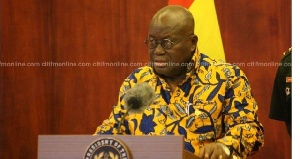 President Nana Addo Dankwa Akufo-Addo
President Nana Addo Dankwa Akufo-Addo
President Nana Addo Dankwa Akufo-Addo has disclosed that a review of 24 power purchase agreements, which had led to the termination of 11 power deals and the rescheduling of eight others, “has enabled us to save the government treasury about $7 billion in excess capacity charges over a 13-year contract period.”
The president continued, “We also issued 7-year and 10-year cedi-denominated bonds, totalling GH¢4.7 billion, which have halved the $2.4 billion energy debt we inherited, and have helped improve the liquidity of the banks, and the balance sheets of the SOEs in the energy sector.”
This year (2018), President Akufo-Addo is hopeful that his government will consolidate these gains and ensure the flow of regular, affordable power to support the economic development of Ghana.
He stated that over the past year, his government has stabilized the supply of power as against the erratic supply that the administration inherited from the erstwhile Mahama’s government.
According to him, adequate power supply is critical to the operation and success of industry, especially small and medium scale enterprises, which provide the bulk of employment.
He explained that not only is regular supply of electricity important, but competitive rates of power are equally important.
It is for this reason that he said, “Tariff rates for non-residential users of electricity, which embrace many SMEs, have been reduced by an average of 14% to boost their competitiveness.”
President Akufo-Addo was speaking at a media encounter at the Flagstaff House on Wednesday while marking his government’s 1st year in office.
He revealed further that an Industrial Development Tariff had been approved for industry to enhance its competitiveness.
To this end, a new rate of $6.50 per Million British Thermal Units (MMBtu), as against the previous rate of US$8.84 per MMBtu, has been established, representing a 26.5% reduction.
Planting for Food & Jobs
On one of his government’s flagship programmes – ‘Planting for Food and Jobs’ – President Akufo-Addo stated that the programme, which registered over 200,000 farmers in the 2017 crop season, has been a big success.
“I am particularly excited about the institutional sub–programmes, where 20 senior technical high schools, National Service Scheme and the Prison Services were supported to cultivate their own farms. Under the ‘Youth in Agriculture’ programme of ‘Planting for Food and Jobs,’ 10,000 youth were supported to cultivate 800 hectares and 10,320 hectares of rice and maize respectively,” he revealed, adding that yields of these crops had increased.
On the fight against illegal mining (galamsey), President Akufo-Addo stressed that his administration inherited a situation where illegal mining or galamsey had become a serious menace to the very existence of the country, explaining that Ghana’s forests and water bodies had become degraded, and the health of those engaged in the activity and their communities were all at risk.
“Let me state here again my gratitude to the media for the support they are giving in the campaign we are undertaking against galamsey. This is not a short term campaign, and we need everybody’s support to make a success of it. As I have said a few times, since the Almighty blessed us with precious minerals, there has always been and always will be mining in our country,” he said.
The president continued, “We are not against mining, but we cannot accept mining in a manner that risks destroying our country. The reforestation programme that we have started should help to regenerate our forest cover and water bodies, and, hopefully, provide an attractive alternative employment to galamsey.
On this subject, all of us, and not just government, have to do things differently.”